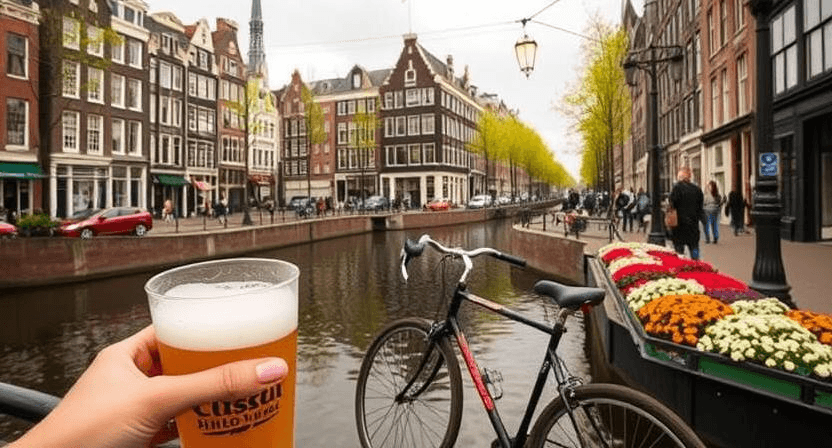Europe Travel Itinerary Dreaming of a European Escape? This guide will walk you through creating the best 2 weeks in Europe itinerary suited to your preference. From world-renowned cities to lesser-known spots, you’ll find inspiration, practicality, and all you need to make your European trip memorable.
How to Use This 2-Week Europe Itinerary Guide
Focusing on regions or themes that suit different travel styles, this guide offers a variety of itinerary suggestions. Whether you’re a first-time visitor or a seasoned globetrotter, this itinerary includes the destinations you won’t want to miss, along with helpful advice on transportation, packing, and logistics.
Two-Week Perfect Europe Travel Itinerary Examples
Here are some realistic patterns for spending your 2 weeks in Europe, spanning varied preferences and places:
The Old-Fashioned Way: London, Paris, Rome

A perfect first-timer’s itinerary for experiencing some of Europe’s most famous cities.
London

- See iconic sites, including the Tower of London, Big Ben, and Westminster Abbey.
- Walk through the lively districts of Covent Garden and Camden Market
- Take a day trip to Stonehenge or Windsor Castle.
Paris

- Marvel at the Eiffel Tower, stroll through Le Marais and visit the Louvre Museum.
- Wander hand-in-hand along the Seine and share croissants and coffee at a French café.
Rome

- Some ancient wonders you can explore are The Colosseum, The Roman Forum, and Vatican City.
- Toss a coin in the Trevi Fountain, and if you’re lucky, enjoy Italian food at a trattoria.
- Hillside Luxury: Bodrum, Amalfi Coast, Santorini
- Ideal if you want lively cities and beautiful coastal scenery.
Madrid

The Royal Palace, Puerta d
el Sol, and Prado Museum.
Feast on local tapas at Mercado de San Miguel.
Rome

- Explore landmarks such as the Pantheon and Piazza Navona.
- Have a gelato in Trastevere.
Amalfi Coast

- Or drive the Amalfi Coast, stopping in Positano, Ravello, and Capri.
- Feast on fresh seafood and drink in the stunning views of the seashore.
- Regal Central Europe: Prague, Vienna & Budapest
- Discover the majestic and wonderful in Central Europe’s most royal cities.
Prague

- Stroll around Old Town Square, tour Prague Castle , and cross the Charles Bridge.
- Have a local beer at a Czech pub.
Vienna

- Soak in the beauty of Schonbrunn Palace, St. Stephen’s Cathedral and Belvedere Palace.
- Catch a classical music concert at one of Vienna’s historic venues.
Budapest

- Europe Travel Itinerary
- Soak in the Széchenyi Thermal Baths, tour Fisherman’s Bastion, and sail the Danube River.
- Savor dishes such as goulash and chimney cakes.
- Wander Through Europe for Art Lovers: Paris, Florence, Venice
- Dive into Europe’s art and architecture.
Paris

- Learn about art at the Musée d’Orsay and Centre Pompidou.
- Stroll the artistic streets of Montmartre.
Florence

- Marvel at Michelangelo’s David at the Accademia Gallery and Mount Giotto’s Bell Tower.
- Visit the Uffizi Gallery and the Ponte Vecchio.
Venice

- See St. Mark’s Basilica, the gondola ride through canals, and the glassblowing on Murano.
- The Fabulous Iberian Peninsula: Lisbon, The Algarve, Andalucia
Lisbon

- Explore Belem Tower, Jerónimos Monastery, and the vibrant Alfama neighborhood.
- Take the beautiful Tram 28 ride. You might like
The Algarve

- Soak up the sun on the beaches of Lagos, partake in water sports, and visit the rugged cliffs of Sagres.
Andalucia

- Discover the Alhambra in Granada, the Cathedral of Seville, and the Mezquita in Cordoba.
- Dance with tradition in Seville, your flamenco birthplace.
- Food + History: Athens, Santorini, Istanbul
Athens

- Visit the Acropolis, Ancient Agora, and Plaka neighborhood.
- Sample traditional Greek dishes such as moussaka and souvlaki
Santorini

- Lounge at Red Beach, visit volcanic isles and sip wine in Oia at sundown.
Istanbul

- See the Hagia Sophia, Topkapi Palace, and the frenetic Grand Bazaar.
- Indulge in Turkish coffee and baklava.
- On October 1, Templer set out through some European cities on an “Architecture + Culture” trip to Cologne, Amsterdam, and Belgium.
C, cologne

- Gaze at the Cologne Cathedral and walk the river promenade along the Rhine.
- Try local Kölsch beer.
Amsterdam

- Visit the Van Gogh Museum and Anne Frank House
- Pedal through picturesque canals and flower markets.
Belgium

- Visit Brussels, Bruges and Ghent.
- Feast on Belgian waffles, fries, and chocolates.
- The Alpine Escape: Bavaria, Switzerland, Milan and Lake Como
Bavaria

- Take in Neuschwanstein Castle, the Bavarian Alps, and Munich.
Switzerland’s Jungfrau Region

- Soak in breathtaking mountain views, take the ferry from Interlaken to Thun, travel by train to Jung fraujoch, hike the Grindelwald Trails, and eat Swiss chocolates.
How to Get Around in 2 Weeks in Europe
Train
Get unlimited travel across Europe with the Eurail Pass.
Bus
Cheap buses like Flix Bus are perfect for intercity transport.
Plane
Low-col carriers such as EasyJet and Ryanair are more than satisfactory for long distances.
Car
Hiring a car is ideal for exploring more remote places in the country.
How to Pack for Europe: What to Bring for 2 Weeks
Comfortable shoes, light jackets, universal adapters, reusable water bottles, and travel-size toiletries.
How to Plan Your 2-Week Europe Vacation.
Planning Europe Travel Itinerary a visit to Europe may prove daunting. However, these recommendations will assist you in seeing the most in your time and keeping away from a few of the pitfalls:
Don’t try to visit too many destinations.
Although temptingly condensed, Europe’s geography is no reason to squeeze as many destinations into your itinerary as possible; it’s better to visit fewer places and experience them.” Hustling alight through too many cities can leave you weary and unable to embrace the unique magic of each place.
Make travel into and out of a significant air traffic hub.
Opt for key hubs like London Heathrow, Paris Charles de Gaulle, or Amsterdam Schiphol to keep your travel costs down and maximize convenience.
When you can, flights should be open jaw.
Flying into one city and out of another saves time and money compared with a round-trip ticket.
Account for Downtime
With so much to see, it’s easy to over-schedule. Make time during the week to unwind, rest, and soak up the local culture.
Be Flexible with Destinations
If one destination isn’t feasible regarding timing or availability, have alternatives. Not being rigid can open you up to new findings.
Factor in Travel Time
Europe Travel Itinerary Switching champion eats into your schedule. Aim for at least 2-3 nights in each significant city and 2-3 hours between destinations.
Big Cities vs. Small Towns
Big cities are usually the most accessible, but the smaller towns have their own charm. Try to include both for a well-rounded journey.
Book Major Attractions Ahead of Time
Popular attractions such as the Eiffel Tower, Colosseum , and Sagrada Familia may sell out. Skip-the-line tickets are worth the cost if you want to save time.
Take a Food Tour
Food tours are a great way to dive into the local cuisine, culture, and history. They’re usually a highlight of any visit.
Be Mindful of Bathroom Policies
Public restrooms in parts of Europe will charge you at the door, so keep smaoms and small change handy.
What To Pack For 2 Weeks In Europe

We all know by now that you must pack lightly and efficiently for a smooth trip. Here’s a preparation checklist:
Clothing

- You can mix and match clothes for maximum versatility.
- This is a must-have jacket for a night cooler.
- Comfortable walking shoes.
- Slippers or sandals for the beach or hostel showers.
Travel Essentials

- Passport and any required visas.
- Travel insurance documents.
- Universal power adapter.
- Daydaypack for lightweight excursions.
- Reusable water bottle.
Toiletries

- Mini shampoo conditioner body wash travel size
- Toothbrush, toothpaste & deodorant.
- Sunscreen and lip balm.
Miscellaneous

- Snacks for long travel days.
- Travel guidebooks or apps.
- A good book or e-reader for the downtimes.
- Portable charger to keep your devices charged.
Read More About Traveling to Europe
Check out more resources to help you plan your European adventure:
- Mecca for Elitists: Top 10 European City Breaks for First-Timers
- The Best Food Tours Throughout Europe
- This Will Change if You Miss in Europe
- How to Use the Eurail Pass Like a Local
- Budget Travel Tips for Europe
Wrap up the ultimate 2-week Europe Travel Itinerary.
Europe Travel Itinerary Visit Europe in another way—for a two-week trip. Whether you’re attracted to the iconic sights of London, Paris, and Rome, the sideshow coastal beauty of the Amalfi Coast, or the artistic charms of Florence and Venice, Europe has something to offer every traveler.
If you plan ahead with your itinerary, stay aware of your travel logistics, and allow some room for spontaneity, you can have the most memorable of travels. Take note of the top things to see at your destination, but be flexible and open to experiences that come your way.
Europe is waiting to dazzle you with its phenomenal variety, so pack.r bags, use this guide and prepare for one of the trips of your lifetime. Happy travels! 🌍✈️
Frequently Asked Questions (FAQ) for 2 Weeks in Europe
Will I Need an Adapter?
Yes, European standards for plugs and voltage are a bit different than you might think. Bring a universal travel adapter to charge your devices.
Is a Money Belt a Good Idea?
Money belts offer more security, especially in crowded tourist areas where pickpocketing is possible.
Is the Water Safe to Drink?
In most European countries, tap water is safe to drink , but always check local guidance.
Are 2 Weeks in Europe Worth It?
Absolutely! Two weeks is enough to combine a few bucket-list destinations with a taste of the continent’s diversity.
How Far Out Is the Language Barrier?
English is spoken in many major tourist destinations. Europe Travel Itinerary However, you’ll also benefit from learning a few words in the local language—it is appreciated.
How Many Places Can You Visit in 2 Weeks?
Limit yourself to 2-4 countries so you do not spend all your time traveling between destinations.
When Should I Tip?
Europe Travel Itinerary Tipping customs vary. In most European countries, a tip is appreciated but not required. 5-10% gratuity is generally good for good service.
When Is the Best Month to Visit Europe?
So spring (April-May) and fall (September-October), with great weather and fewer throngs, are best for travel (just be careful to reserve ahead!).



